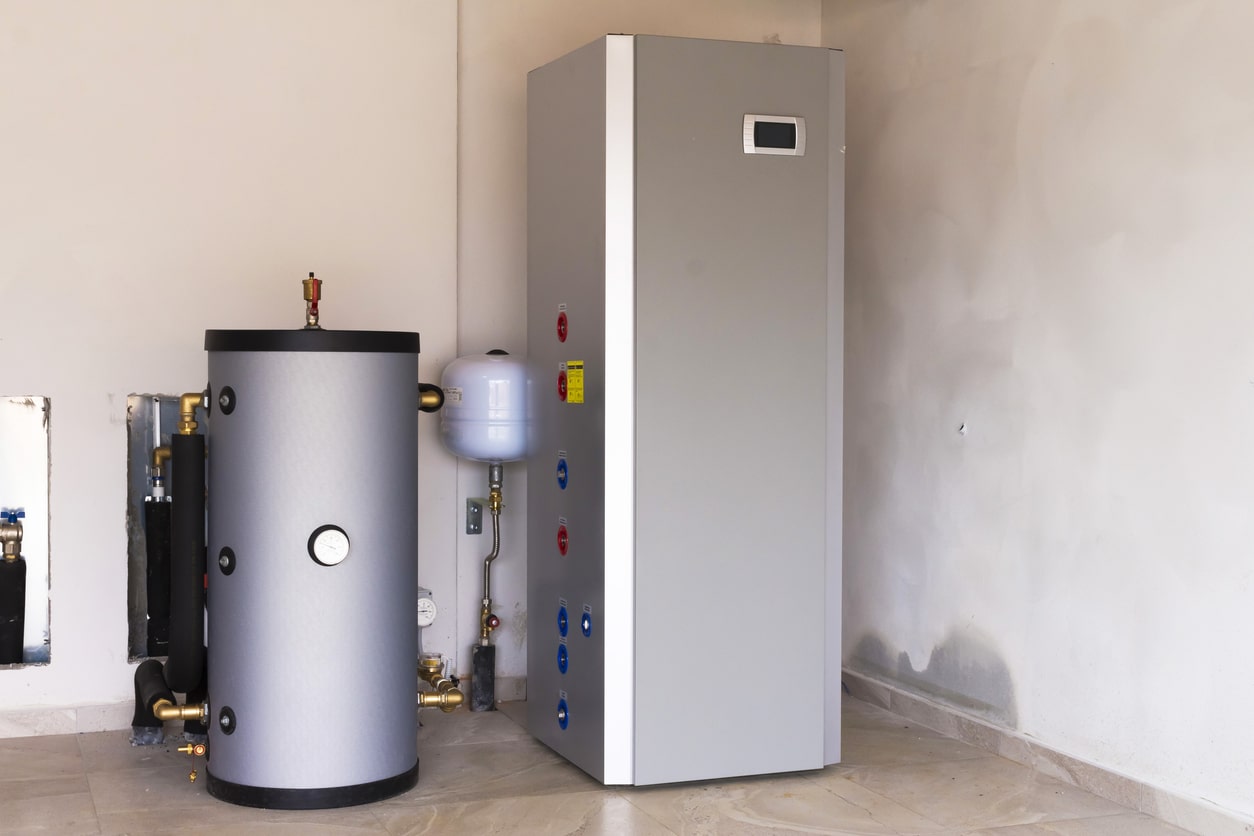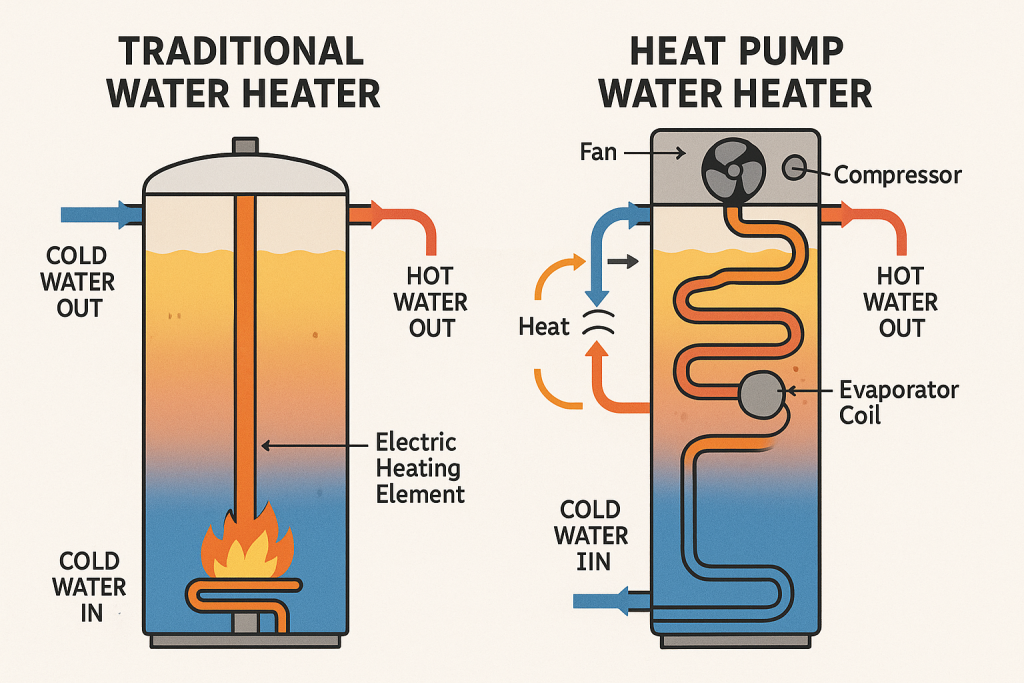Heat Pump Water Heater Lifespan: At a Glance
Yes—heat pump water heaters last longer than traditional models.
Here’s why homeowners upgrade:
Typical lifespan: 13–15 years (often 20+ with maintenance)
Traditional water heaters: usually 8–12 years
Less wear on parts by moving heat instead of creating it
Lower energy use means less stress on the system
IRA rebates up to $1,750 help offset upfront costs
Bottom line: longer life, lower bills, fewer cold-shower surprises.
A water heater is one of those appliances you don’t think about—until you’re suddenly showering in ice water and wondering where it all went wrong. If you’re considering switching to a heat pump water heater, you might be asking yourself, “How long does this thing actually last?”
The good news? Heat pump water heaters boast an impressive lifespan, outlasting traditional models while slashing energy bills in the process.
Let’s break down the typical lifespan of a heat pump water heater, what impacts its longevity, and how to make it last even longer with a few simple maintenance habits.
Heat Pump Water Heater Lifespan: The Long Game
A well-maintained heat pump water heater typically lasts 13 to 15 years and sometimes even 20 years under the right conditions. That’s a significant upgrade from standard electric or gas water heaters, which usually tap out after 8 to 12 years.
Why Do Heat Pump Water Heaters Last Longer?
Unlike conventional water heaters, which generate heat by burning fuel or using a resistive heating element, heat pump water heaters work by pulling heat from the surrounding air and transferring it into the water tank. This process is far more efficient and puts less strain on internal components, leading to a longer, healthier lifespan.
But before you start planning for two decades of worry-free hot showers, let’s talk about what affects the lifespan of your heat pump water heater—and what you can do to extend it.
Factors That Affect Your Water Heater’s Lifespan
1. Water Quality Matters
Hard water is the enemy of any water heater. Minerals like calcium and magnesium can build up over time, leading to sediment accumulation in the tank and reducing efficiency. If your home has hard water, consider installing a water softener to keep things running smoothly.
2. Proper Installation
A poorly installed water heater is doomed from the start. Incorrect wiring, improper placement, or inadequate ventilation can cause premature wear and tear. That’s why it’s essential to hire a professional water heater installer—not just to maximize efficiency but also to qualify for IRA rebates and incentives (more on that later).
3. Regular Maintenance (It’s Easier Than You Think!)
Want to keep your water heater running strong? Give it some TLC. Here are a few simple maintenance tasks that can add years to its lifespan:
- Flush the Tank Annually—This removes sediment buildup that could affect performance.
- Check the Anode Rod—This small metal rod prevents rust from eating away at your tank. To prevent leaks, replace it every 3-5 years.
- Clean the Air Filter—Since heat pump water heaters pull in air, a clogged filter can reduce efficiency. A quick cleaning every few months keeps it running smoothly.
- Inspect for Leaks or Strange Noises—If your water heater is making a gurgling or knocking sound, it’s time to investigate!
How to Make Your Heat Pump Water Heater Last Even Longer
Besides regular maintenance, here are a few extra steps to stretch your heat pump water heater’s lifespan to 20+ years.
1. Choose the Right Location
Heat pump water heaters work best in moderate to warm environments. If installed in a cold, unheated garage, they may struggle to pull enough heat from the air. A basement, utility room, or insulated garage is ideal for peak performance.
2. Set the Temperature Correctly
The U.S. Department of Energy recommends setting your water heater to 120°F. Higher temperatures increase wear and tear, while lower settings may not provide enough hot water. Find the sweet spot for comfort and efficiency.
3. Don’t Overwork It
Your water heater can only do so much! If your household uses a lot of hot water, consider a larger tank or an on-demand booster to prevent excessive cycling, which can shorten its lifespan.
How Do Heat Pump Water Heaters Compare to Traditional Models?
| Feature | Heat Pump Water Heater | Traditional Water Heater |
| Lifespan | 13-20 years | 8-12 years |
| Energy Efficiency | Uses 60% less energy | Higher energy use |
| Operating Costs | Lower utility bills | Higher utility bills |
| Upfront Cost | Higher (but offset by rebates) | Lower |
| Environmental Impact | Eco-friendly | More emissions |
Don’t Forget About Rebates!
Worried about the upfront cost? Don’t be! The Inflation Reduction Act (IRA) offers up to $1,750 in rebates for installing a heat pump water heater. That means you could get a brand-new, energy-efficient water heater for little to no cost after incentives.
At MyNewHeatPump.com, we connect homeowners and landlords with local, qualified contractors to make the process seamless. From finding the right system to handling rebate paperwork, we’re here to help you upgrade without the headache.
No Cold Showers Here—Heat Pump Water Heater FAQs
How long does a heat pump water heater last?
On average, a heat pump water heater lasts between 13 to 15 years, but with proper maintenance, it can reach 20 years or more. This lifespan surpasses that of traditional electric and gas water heaters, which typically last 8 to 12 years. Regular upkeep, such as flushing the tank and replacing the anode rod, plays a crucial role in ensuring long-term performance.
Are heat pump water heaters reliable?
Yes! Heat pump water heaters are designed for efficiency and reliability, making them a great long-term investment. Unlike conventional models, they use advanced heat pump technology and include backup heating elements to ensure consistent hot water, even in colder conditions. As long as they’re installed correctly and maintained regularly, they operate efficiently with minimal issues.
What’s the best way to extend the lifespan of my heat pump water heater?
Routine maintenance is essential to maximizing the lifespan of your system. Flushing the tank once a year helps prevent sediment buildup while cleaning the air filter allows for efficient heat transfer. Additionally, checking and replacing the anode rod every 3 to 5 years can prevent corrosion, keeping the tank in top shape for years to come.
Is a heat pump water heater worth it?
Heat pump water heaters are one of the most energy-efficient options available, using up to 60% less energy than traditional models. They significantly lower monthly utility bills, and with rebates up to $1,750 through the Inflation Reduction Act, the upfront cost can be drastically reduced. Over time, the energy savings, long lifespan, and eco-friendly benefits make them a smart and cost-effective choice for homeowners.
Final Thoughts: A Smart Investment for Long-Term Savings
A heat pump water heater isn’t just an upgrade—it’s an investment in energy savings, lower utility bills, and years of reliable hot water. With a longer lifespan, lower operating costs, and generous rebates, making the switch is a no-brainer for homeowners looking for efficiency and sustainability.
If you’re ready to make the switch and save big, check your eligibility for IRA rebates today and enjoy hot showers, lower bills, and peace of mind for years to come!
MyNewHeatPump.com is Here to Help You Navigate Federal Rebates!
You may be eligible for up to $14,000 in free home upgrades through the Inflation Reduction Act! Let us help you maximize your incentives and make your home more efficient today. FIll out our free eligibility questionnaire to get started.



